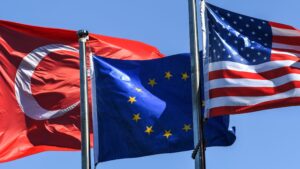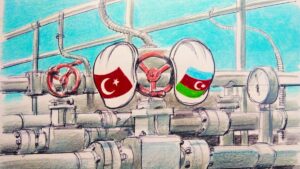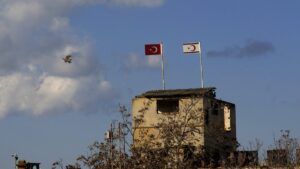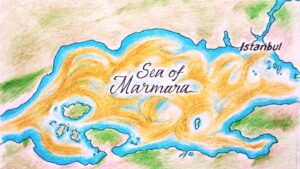Certainly, stating that Italy and Türkiye are experiencing a golden time is not exaggerating. The relations have indeed sealed a new important level both in terms of business and institutional contacts. A simple piece of data: in the last three years, bilateral trade has grown by 1/3, and nowadays, it marks a record $32 billion, thus going well beyond the joint target of $30 billion, as it was stated during the last Jetco and subsequently during the 2022 Italy-Türkiye intergovernmental summit.
Just a few months ago, bilateral trade had stood at $28 billion, marking a more recent surge that proves the great complementarity and congruence of the business environments. Synergies are evident in many sectors, especially textiles, chemicals, pharmaceuticals, automotive and machinery.
As Italy is among the five countries Türkiye exports the most, it is now evident that relations will boost in the near future along with new and ambitious goals. More recently, thanks also to the propulsive push of diplomacy and politics, the margins of cooperation have been significantly increasing both in terms of economic and industrial partnerships. In this context, the acquisition of Whirlpool and its Italian factories by Turkish Arçelik/BEKO, which is part of the Koç group, had been accomplished.
The most recent acquisition of Piaggio Aerospace by Baykar, the Turkish company leader in the production of unmanned drones, has raised much enthusiasm. The move has been carefully followed and supported at the political level, along with clear strategic visions. In this regard, the relations between the parties are continuous and profitable. In recent weeks, the CEO of Baykar, Selçuk Bayraktar, paid a visit to Italy’s Piaggio facilities, starting new consultations on business development plans and worker protection. This was then followed by meetings in Istanbul with the minister for Business and Made in Italy, Adolfo Urso, who was accompanied by Leonardo’s Chairperson Stefano Pontecorvo hence signaling positive developments in the already discussed framework of defense cooperation.
Italy-Türkiye industrial partnerships are therefore crucial as pivots to strengthen and extend bilateral cooperation in terms of innovation and technology and, finally, to elevate the two countries as major regional stakeholders. “Baykar is a leader in the production of drones and the fact that it will produce in Italy, expanding in Europe and beyond, is of crucial importance for the international positioning of the two countries,” stated Minister Urso. Besides, Türkiye’s minister of Technology and Innovation Mehmet Fatih Kacır emphasized that Türkiye and Italy are “Two leading production centers of the Mediterranean, thus they develop their centuries-old relations and economic partnership day by day.”
Rome and Ankara are perceived as the natural bridge between Europe, the Mediterranean and the Middle East. In the Euro-Mediterranean area, Italy and Türkiye have been historic players. In Africa, while Rome shows renewed activism, Ankara boasts important stakes. The same goes for the Near East. Thus, their mutual pragmatism and vision lead to building and enforcing synergies in these regions, which will ultimately ensure greater regional integration.
As Urso says: “Strengthening industrial cooperation means contributing to the stability of the region and creating new development opportunities.” Hence, greater regional integration arises as a strategic imperative to face the numerous global challenges and to restrict the high degree of instability and unpredictability of the current international system. Greater integration at every level, however, requires a regulatory framework and shared good practices; in this spirit, during the meeting between the Italian minister of Justice, Carlo Nordio, and his counterpart, Yılmaz Tunç, the need to strengthen further the historic and intense judicial cooperation was pointed out.
With less than two months to go until the next Italian-Turkish intergovernmental summit in Rome, the political commitment and diplomatic efforts are evident and constructive. Strengthening relations between Italy and Türkiye passes through consolidating mutual regional stances and enforcing cooperative frameworks. This is an asset for establishing a solid axis at an international level. Hence, there is room to believe that numerous new agreements will be signed in various sectors in Rome, which will eventually enrich the already nourished files. Looking at the results achieved so far, the future seems increasingly sparkling and successful, along with new opportunities to exploit together.
The current golden age is based on strategic and political convenience, and it is the natural culmination of a century-old historical journey together where Türkiye and Italy stood as good friends and interlocutors.




















































Be First to Comment